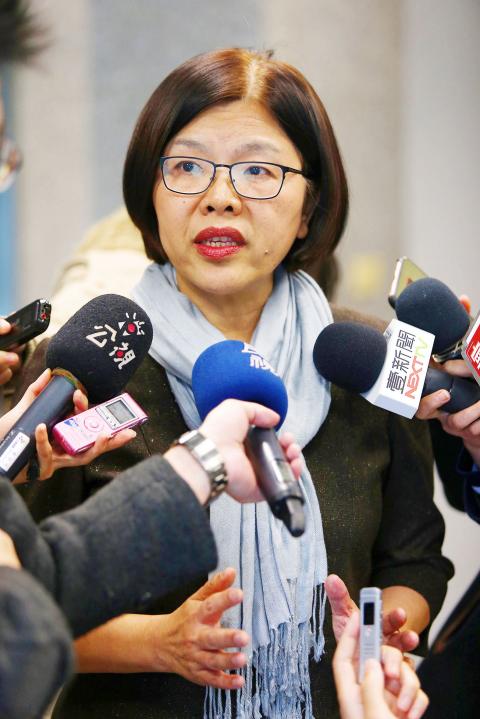The Ill-gotten Party Assets Settlement Committee is to reopen an investigation into the Chinese Nationalist Party’s (KMT) acquisition of the land housing the party’s National Development and Research Institute to determine if it involved any impropriety.
The committee is to hold a hearing in May and if the acquisition was found to have involved an abuse of government power, the KMT would have to return the illicit gains, committee spokeswoman Shih Chin-fang (施錦芳) said yesterday.
The institute sits on an 8,300 ping (2.74 hectare) plot of land in Taipei’s Muzha District (木柵), which the KMT acquired in 1964 during its one-party rule.

Photo: CNA
Yeh Sung-jen (葉頌仁), son of the original landowner, filed a complaint with the committee in October last year, accusing the KMT of illegally seizing the property.
Yeh accused the KMT of attempting to force his father to sell the land to it for NT$191,100 (US$6,178 at the current exchange rate), or about NT$5 per ping, well below the market value at the time, which was NT$200 per ping.
His father was unwilling to sell the property, but the KMT nonetheless had the land transferred into its name and deposited NT$19,000 — about one-tenth of the amount stated in the contract offered — with the courts, Yeh said.
The elder Yeh refused to take the money, which, in effect, allowed the KMT to take over the property without compensation, his son said.
Yeh Sung-jen sued the KMT in 2007, accusing it of abuse of power and demanding that it either return the property or pay NT$78.56 million in compensation, but a court ruled in favor of the KMT, saying there was no proof that Yeh’s father had been forced to sell the land.
Shih said the court ruling centered on Yeh’s demand to return the property to his family, instead of determining if the acquisition involved abuse of government power, which would be the focus of the committee’s investigation.
“If the rights of the people involved in the acquisition were infringed, we would seek to have [the KMT] return [improper gains] in the spirit of transitional justice,” she said.
The committee would seek to determine the legitimacy of the acquisition, and it would hand over any new evidence to the judiciary, she said.
The case would be the committee’s first attempt to address cases in which a final court verdict was handed down.
The KMT responded angrily to news of the probe, with Culture and Communications Committee deputy director Hu Wen-chi (胡文琦) accusing the committee of rehashing old issues.
“The KMT disapproves of how the committee has let its administrative power override judicial authority and how the Democratic Progressive Party is trying to reheat leftovers,” Hu said.
Hu said the KMT can undoubtedly withstand scrutiny, urging the committee to avoid applying double standards and to also look into the Taiwan Research Institute founded by former president Lee Teng-hui (李登輝).
The KMT has claimed that Lee instructed former KMT treasurer Liu Tai-ying (劉泰英) to sell the land housing the Broadcasting Corp of China, which the party used to own, on Taipei’s Renai Road in 1999 at an unreasonably low price to a construction company.
As about NT$290 million of the money from the sale was allegedly later given to the Taiwan Research Institute, the KMT called on the committee to also determine if the institute is an organization affiliated with the KMT.
Additional reporting by Stacy Hsu

Alain Robert, known as the "French Spider-Man," praised Alex Honnold as exceptionally well-prepared after the US climber completed a free solo ascent of Taipei 101 yesterday. Robert said Honnold's ascent of the 508m-tall skyscraper in just more than one-and-a-half hours without using safety ropes or equipment was a remarkable achievement. "This is my life," he said in an interview conducted in French, adding that he liked the feeling of being "on the edge of danger." The 63-year-old Frenchman climbed Taipei 101 using ropes in December 2004, taking about four hours to reach the top. On a one-to-10 scale of difficulty, Robert said Taipei 101

Nipah virus infection is to be officially listed as a category 5 notifiable infectious disease in Taiwan in March, while clinical treatment guidelines are being formulated, the Centers for Disease Control (CDC) said yesterday. With Nipah infections being reported in other countries and considering its relatively high fatality rate, the centers on Jan. 16 announced that it would be listed as a notifiable infectious disease to bolster the nation’s systematic early warning system and increase public awareness, the CDC said. Bangladesh reported four fatal cases last year in separate districts, with three linked to raw date palm sap consumption, CDC Epidemic Intelligence

Two Taiwanese prosecutors were questioned by Chinese security personnel at their hotel during a trip to China’s Henan Province this month, the Mainland Affairs Council (MAC) said yesterday. The officers had personal information on the prosecutors, including “when they were assigned to their posts, their work locations and job titles,” MAC Deputy Minister and spokesman Liang Wen-chieh (梁文傑) said. On top of asking about their agencies and positions, the officers also questioned the prosecutors about the Cross-Strait Joint Crime-Fighting and Judicial Mutual Assistance Agreement, a pact that serves as the framework for Taiwan-China cooperation on combating crime and providing judicial assistance, Liang

US climber Alex Honnold left Taiwan this morning a day after completing a free-solo ascent of Taipei 101, a feat that drew cheers from onlookers and gained widespread international attention. Honnold yesterday scaled the 101-story skyscraper without a rope or safety harness. The climb — the highest urban free-solo ascent ever attempted — took just more than 90 minutes and was streamed live on Netflix. It was covered by major international news outlets including CNN, the New York Times, the Guardian and the Wall Street Journal. As Honnold prepared to leave Taiwan today, he attracted a crowd when he and his wife, Sanni,